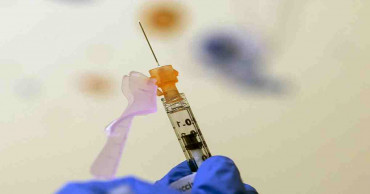Pfizer
Moderna sues Pfizer over patents behind COVID-19 vaccine
COVID-19 vaccine maker Moderna is suing Pfizer and the German drugmaker BioNTech, accusing its main competitors of copying Moderna’s technology in order to make their own vaccine.
Moderna said Friday that Pfizer and BioNTech’s vaccine Comirnaty infringes on patents Moderna filed several years ago protecting the technology behind its preventive shot, Spikevax. The company filed patent infringement lawsuits in both U.S. federal court and a German court.
Pfizer spokeswoman Pam Eisele said the company had not fully reviewed Moderna’s lawsuit, but the drugmaker was surprised by it, given that their vaccine is based on proprietary technology developed by both BioNTech and Pfizer.
She said in an email that the company would “vigorously defend” against any allegations in the case.
BioNTech did not immediately respond to a request from The Associated Press seeking comment.
Moderna and Pfizer’s two-shot vaccines both use mRNA technology to help patients fight the coronavirus.
The mRNA vaccines work by injecting a genetic code for the spike protein that coats the surface of the coronavirus. That code, the mRNA, is encased in a little ball of fat, and instructs the body’s cells to make some harmless spike copies that train the immune system to recognize the real virus.That approach is radically different than how vaccines have traditionally been made.
Read: Int'l community urged to intensify pressure on Myanmar military to stop violence against its people
Moderna said it started developing its mRNA technology platform in 2010, and that helped the company quickly produce its COVID-19 vaccine after the pandemic arrived in early 2020.
By the end of that year, U.S. regulators had cleared shots from both Pfizer and Moderna for use after clinical research showed that both were highly effective.
Moderna CEO Stephane Bancel said in a prepared statement that the vaccine developer pioneered that technology and invested billions of dollars in creating it.
The company said it believes its rivals’ vaccine infringes on patents Moderna filed between 2010 and 2016.
Moderna said it recognizes the importance of vaccine access and is not seeking to remove Comirnaty from the market. It also is not asking for an injunction to prevent future sales.
Moderna said in 2020 that it would not enforce its COVID-19 related patents while the pandemic continued. But the company said in March, with vaccine supplies improving globally, that it would update that pledge.
It said it still would not enforce its patients for vaccines used in low- and middle-income countries. But it expected companies like Pfizer and BioNTech to respect its intellectual property, and it would consider “a commercially reasonable license” in other markets if they requested one.
“Pfizer and BioNTech have failed to do so,” Moderna said in a statement.
3 years ago
US donates additional 10mn Pfizer COVID-19 vaccine doses to Bangladesh
The US government has donated another 10 million (1 crore) doses of Pfizer’s COVID-19 vaccine to Bangladesh via COVAX to help the Ministry of Health and Family Welfare continue expanding vaccinations to teens and adults across the country.
This delivery brings the total number of all U.S. vaccine donations to over 85 million (8.5 crore) doses, said the US Embassy in Dhaka on Tuesday.
More than two-thirds of all international COVID-19 vaccine donations to Bangladesh have come from the United States and the American people.
Also read: Bangladesh receives more doses of Pfizer COVID-19 vaccine from US
The United States said it continues to work closely with Bangladesh to support every facet of the national COVID-19 vaccination campaign.
This effort includes training over 51,000 healthcare providers and other workers on safely administering vaccines to support Bangladesh’s COVID-19 vaccination roll out across 64 districts.
The United States has also donated 18 freezer vans, 750 freezer units, and 8,000 vaccine carriers and helped transport 57 million doses of vaccines to remote areas – for direct administration of 47 million vaccinations.
Also read: Administering 2nd dose of oral cholera vaccine begins August 3 in 5 Dhaka areas
In Bangladesh, the United States has contributed more than $140 million in COVID-19 related development and humanitarian assistance. Globally, the United States has donated $4 billion to support the COVAX effort, which includes support for ultra-cold chain storage, transportation, and safe handling of COVID-19 vaccines, making the United States the world’s largest donor for equitable global COVID-19 vaccine access.
3 years ago
Bangladesh receives more doses of Pfizer COVID-19 vaccine from US
The US government has donated another 1.5 million pediatric doses of Pfizer’s COVID-19 vaccine to Bangladesh via COVAX to help the government of Bangladesh expand vaccination coverage to protect children ages 5-11 for the very first time.
This delivery marks the second shipment of US-donated vaccines for young children this week and brings the total number of all US vaccine donations to over 75 million doses, said the US Embassy in Dhaka on Monday.
More than two-thirds of all international COVID-19 vaccine donations to Bangladesh have come from the United States and the American people.
Also read: Covid-19 vaccine consignment for kids arrive in Dhaka
The United States continues to work closely with Bangladesh to support every facet of the national COVID-19 vaccination campaign, according to the US Embassy.
This includes training to over 51,000 healthcare providers and other workers on safely administering vaccines to support Bangladesh’s COVID-19 vaccination roll out across 64 districts.
The United States has also donated 18 freezer vans, 750 freezer units, and 8,000 vaccine carriers and helped transport 57 million doses of vaccines to remote areas – for direct administration of 47 million vaccinations.
In Bangladesh, the United States has contributed more than $140 million in COVID-19 related development and humanitarian assistance, said the US Embassy.
Also read: Bangladesh gets another 4 mn doses of COVID-19 vaccine from US
Globally, the United States has donated $4 billion to support the COVAX effort, which includes support for ultra-cold chain storage, transportation, and safe handling of COVID-19 vaccines, making the United States the world’s largest donor for equitable global COVID-19 vaccine access.
3 years ago
Pfizer calls upon global health leaders, orgs to join ‘Accord for a Healthier World’
Pfizer has called upon the global health leaders and organizations to join the Accord, bringing their expertise and resources to close the health equity gap and help create a healthier world for 1.2 billion people.
Pfizer Inc. (NYSE: PFE) on Wednesday launched ‘An Accord for a Healthier World.’ This groundbreaking initiative aims to provide all of Pfizer’s patented, high-quality medicines and vaccines available in the U.S. or the European Union on a not-for-profit basis to 1.2 billion people in 45 lower-income countries.
The Accord seeks to greatly reduce the health inequities that exist between many lower-income countries and the rest of the world.
“As we learned in the global COVID-19 vaccine rollout, supply is only the first step to helping patients. We will work closely with global health leaders to make improvements in diagnosis, education, infrastructure, storage and more. Only when all the obstacles are overcome can we end healthcare inequities and deliver for all patients,” said Pfizer Chairman and Chief Executive Officer Albert Bourla.
Also read: Pfizer says 3 COVID shots protect children under 5
The Accord countries include all 27 low-income countries as well as 18 lower-middle-income countries that have transitioned from low to lower-middle-income classification in the last ten years, said a media release received from Switzerland.
Pfizer will work with healthcare officials in Rwanda, Ghana, Malawi, Senegal and Uganda to identify early insights and opportunities to ensure all medicines and vaccines can reach those in need.
This will include expertise to support diagnosis, healthcare professional education and training along with supply chain management and other infrastructure enhancements.
Learnings from these five countries will be applied to support the roll out for the remaining forty countries.
Pfizer will also collaborate with Accord participants to identify quick and efficient regulatory pathways and procurement processes to reduce the longer amount of time it can take to make new medicines and vaccines available in these countries.
Under the Accord, Pfizer has committed to provide 23 medicines and vaccines that treat infectious diseases, certain cancers, and rare and inflammatory diseases.
As Pfizer launches new medicines and vaccines, those products will also be included in the Accord portfolio on a not-for-profit basis.
The Accord also aims to establish faster access to Pfizer’s future pipeline medicines and vaccines on a not-for-profit-basis to the 45 countries, particularly those that treat diseases that disproportionately impact global health.
To further this commitment, Pfizer, with funding from the Bill & Melinda Gates Foundation, is advancing work on the development of vaccine candidates for the prevention of Group B Streptococcus (GBS), which is a leading cause of stillbirth and newborn mortality in low-income countries.
Also read: CDC urges Pfizer booster for children ages 5 to 11
They are also discussing opportunities to support Respiratory Syncytial Virus (RSV) vaccine development, another maternal vaccine.
“Everyone, no matter where they live, should have the same access to innovative, life-saving drugs and vaccines,” said Bill Gates, Co-Chair of the Bill & Melinda Gates Foundation. “The Accord for a Healthier World could help millions more people in low-income countries get the tools they need to live a healthy life. Pfizer is setting an example for other companies to follow.”
3 years ago
Pfizer says 3 COVID shots protect children under 5
Three doses of Pfizer’s COVID-19 vaccine offer strong protection for children younger than 5, the company announced Monday. Pfizer plans to give the data to U.S. regulators later this week in a step toward letting the littlest kids get the shots.
The news comes after months of anxious waiting by parents desperate to vaccinate their babies, toddlers and preschoolers, especially as COVID-19 cases once again are rising. The 18 million tots under 5 are the only group in the U.S. not yet eligible for COVID-19 vaccination.
The Food and Drug Administration has begun evaluating data from rival Moderna, which hopes to begin offering two kid-sized shots by summer.
Pfizer has had a bumpier time figuring out its approach. It aims to give tots an even lower dose — just one-tenth of the amount adults receive — but discovered during its trial that two shots didn’t seem quite strong enough for preschoolers. So researchers gave a third shot to more than 1,600 youngsters — from age 6 months to 4 years — during the winter surge of the omicron variant.
Also read: CDC urges Pfizer booster for children ages 5 to 11
In a press release, Pfizer and its partner BioNTech said the extra shot did the trick, revving up tots’ levels of virus-fighting antibodies enough to meet FDA criteria for emergency use of the vaccine with no safety problems.
Preliminary data suggested the three-dose series is 80% effective in preventing symptomatic COVID-19, the companies said, but they cautioned the calculation is based on just 10 cases diagnosed among study participants by the end of April. The study rules state that at least 21 cases are needed to formally determine effectiveness, and Pfizer promised an update as soon as more data is available.
The companies already had submitted data on the first two doses to the FDA, and BioNTech’s CEO, Dr. Ugur Sahin, said the final third-shot data would be submitted this week.
“The study suggests that a low, 3-microgram dose of our vaccine, carefully selected based on tolerability data, provides young children with a high level of protection against the recent COVID-19 strains,” he said in a statement.
What’s next? FDA vaccine chief Dr. Peter Marks has pledged the agency will “move quickly without sacrificing our standards” in evaluating tot-sized doses from both Pfizer and Moderna.
The agency has set tentative dates next month for its scientific advisers to publicly debate data from each company.
Also read: WHO recommends Pfizer's Covid pill Paxlovid
Moderna is seeking to be the first to vaccinate the littlest kids. It submitted data to the FDA saying tots develop high levels of virus-fighting antibodies after two shots that contain a quarter of the dose given to adults. The Moderna study found effectiveness against symptomatic COVID-19 was 40% to 50% during the omicon surge, much like for adults who’ve only had two vaccine doses.
Complicating Moderna’s progress, the FDA so far has allowed its vaccine to be used only in adults.
The FDA is expected to review Moderna’s data on both the youngest age group, plus its study of teens and elementary-age children. Other countries already have expanded Moderna’s shot to kids as young as 6.
While COVID-19 generally isn’t as dangerous to youngsters as to adults, some children do become severely ill or even die. And the omicron variant hit children especially hard, with those under 5 hospitalized at higher rates than at the peak of the previous delta surge.
It’s not clear how much demand there will be to vaccinate the youngest kids. Pfizer shots for 5- to 11-year-olds opened in November, but only about 30% of that age group have gotten the recommended initial two doses. Last week, U.S. health authorities said elementary-age children should get a booster shot just like everyone 12 and older is supposed to get, for the best protection against the latest coronavirus variants.
3 years ago
CDC urges Pfizer booster for children ages 5 to 11
Kids ages 5 to 11 should get a booster dose of Pfizer’s COVID-19 vaccine, advisers to the U.S. government said Thursday.
The Center for Disease Control and Prevention quickly adopted the panel’s recommendation, opening a third COVID-19 shot to healthy elementary-age kids — just like what is already recommended for everybody 12 and older.
The hope is that an extra shot will shore up protection for kids ages 5 to 11 as infections once again are on the rise.
Also read:N. Korea's low death count questioned amid COVID-19 outbreak
“Vaccination with a primary series among this age group has lagged behind other age groups leaving them vulnerable to serious illness,” said CDC Director Dr. Rochelle Walensky, in a statement.
“We know that these vaccines are safe, and we must continue to increase the number of children who are protected,” she said.
Earlier this week, the Food and Drug Administration authorized Pfizer's kid-sized booster, to be offered at least five months after the youngsters' last shot.
The CDC takes the next step of recommending who actually needs vaccinations. Its advisers debated if all otherwise healthy 5- to 11-year-olds need an extra dose, especially since so many children were infected during the huge winter surge of the omicron variant.
But the U.S. now is averaging 100,000 new cases a day for the first time since February. And ultimately, the CDC's advisers pointed to growing evidence from older kids and adults that two primary vaccinations plus a booster are providing the best protection against the newest coronavirus variants.
“This always perhaps should have been a three-dose vaccine,” said Dr. Grace Lee of Stanford University, who chairs the CDC’s advisory panel.
The booster question isn't the hottest vaccine topic: Parents still are anxiously awaiting a chance to vaccinate kids under 5 — the only group not yet eligible in the U.S.
Dr. Doran Fink of the Food and Drug Administration said the agency is working “as rapidly as we can” to evaluate an application from vaccine maker Moderna, and is awaiting final data on the littlest kids from rival Pfizer. The FDA's own advisers are expected to publicly debate data from one or both companies next month.
For the 5- to 11-year-olds, it’s not clear how much booster demand there will be. Only about 30% of that age group have had the initial two Pfizer doses since vaccinations opened to them in November.
CDC adviser Dr. Helen Keipp Talbot of Vanderbilt University said health authorities must put more effort into getting youngsters their initial shots.
“That needs to be a priority,” she said.
Also read: Shanghai to reopen subways in easing of COVID restrictions
Thursday's decision also means that 5- to 11-year-olds with severely weakened immune systems, who are supposed to get three initial shots, would be eligible for a fourth dose.
Pfizer and its partner BioNTech currently make the only COVID-19 vaccine available for children of any age in the U.S. Those ages 5 to 11 receive a dose that’s one-third the amount given to everyone 12 and older.
In a small study, Pfizer found a booster revved up those kids’ levels of virus-fighting antibodies — including those able to fight the super-contagious omicron variant — the same kind of jump adults get from an extra shot.
Vaccines may not always prevent milder infections, and the omicron variant proved especially able to slip past their defenses. But CDC cited data during the omicron surge that showed unvaccinated 5- to 11-year-olds had twice the rate of hospitalization as youngsters who got their first two doses.
Health authorities say for all ages, the vaccines are still offering strong protection against COVID-19's worst outcomes, especially after a third dose.
Some especially high-risk people, including those 50 and older, have been offered the choice of a second booster, or fourth shot — and the CDC on Thursday strengthened that recommendation, too, urging anyone who's eligible to go ahead and get the extra dose.
Still to be decided is whether everyone will need additional shots in the fall, possibly reformulated to offer better protection against newer coronavirus variants.
3 years ago
Beximco gets sub-licence to produce Pfizer's Covid drug
Beximco Pharma has got a sub-licence from the United Nations-backed Medicines Patent Pool to produce a generic version of Paxlovid, Pfizer's oral treatment for Covid.
Beximco will manufacture this drug – a combination of nirmatrelvir and ritonavir – in Bangladesh following successful technology transfer and manufacturing regulatory approvals.
Nirmatrelvir is a novel main protease inhibitor that specifically blocks the activity of the enzyme needed for SARS-CoV2 viral replication.
Read: Raise awareness about consumers’ rights: Tipu
Ritonavir is a strong cytochrome P450 (CYP) 3A4 inhibitor and pharmacokinetic boosting agent for nirmatrelvir.
Paxlovid got the emergency use authorisation from the US Food and Drug Administration in December 2021 for the treatment of mild-to-moderate Covid in adults and pediatric patients (12 years of age and older).
The sub-licence was granted under a voluntary licencing agreement between Pfizer and Medicines Patent Pool to facilitate broader global access to this antiviral combination.
Read South Sudanese delegation visits Beximco, Pran-RFL, Walton manufacturing units
On 20 January 2022, Beximco got a sublicence from Medicines Patent Pool to produce another Covid drug, molnupiravir, which was developed by MSD and Ridgeback Biotherapeutics.
Beximco Pharma Managing Director Nazmul Hassan said: "We are delighted that Medicines Patent Pool has granted us a sub-licence to produce Pfizer's breakthrough Covid-19 treatment, which builds on the licence granted to us in January 2022 for the production of molnupiravir."
3 years ago
Pfizer asks US to allow 4th COVID vaccine dose for seniors
Pfizer and its partner BioNTech asked U.S. regulators Tuesday to authorize an additional booster dose of their COVID-19 vaccine for seniors, saying data from Israel suggests older adults would benefit.
Currently the U.S. urges two primary shots followed months later by a booster dose for everyone age 12 and older. The new application seeks to add a fourth shot only for the over-65 population that has been hit hardest by the pandemic.
The Food and Drug Administration and the Centers for Disease Control would have to approve the request. If so, a key question would be how soon seniors would be advised to roll up their sleeves.
While authorities say the vaccinations continue to offer strong protection against severe illness, they haven’t held up as well against milder infections especially those due to the omicron mutant. With COVID-19 cases finally plummeting after the intense omicron surge, public health experts are starting to look ahead to what next steps might be needed — if a new variant crops up or, barring that, whether to try shoring up coronavirus protection in the fall at the same time people get flu vaccinations.
Read: Global Covid cases top 461 million
Speaking to CBS’ “Face the Nation” on Sunday, Pfizer CEO Albert Bourla signaled the company’s plans.
“The protection that you are getting from the third, it is good enough, actually quite good for hospitalizations and deaths. It’s not that good against infections,” he said. “But we are just submitting those data to the FDA and then we will see what the experts also will say outside Pfizer.”
The U.S. booster campaign was based on evidence that the shots’ effectiveness, particularly against milder infections, was waning about six months after the last dose. Calls for a third shot grew once it became clear the vaccines weren’t as strong against the omicron mutant as they were against earlier versions of the virus.
Many scientists say the ultimate goal of vaccination is to prevent severe illness, not mild infections, and early CDC data show the shots still are doing a good job at that. During the omicron wave, effectiveness against hospitalization was 91% in people who had gotten their booster two months earlier, and 78% by the fourth month after that booster.
Pfizer based its new application on data from Israel, which already was offering a second booster to people age 60 and older and health care workers.
While some early data left unclear just how much benefit another shot offered — or for how long — Pfizer said Tuesday that an analysis of health records of more than 1.1 million Israeli seniors showed confirmed infections were two times lower and rates of severe illness were four times lower among those who got two boosters instead of just one.
Read: Symptoms of Omicron: How is it different from Covid-19 Variant Delta
Pfizer also cited an ongoing study of healthcare workers that tracked a jump in virus-fighting antibodies after getting the additional booster.
In the U.S. so far, a fourth dose is recommended only for people with severely weakened immune systems, who need three doses to begin with for the best chance at any protection.
3 years ago
US donates 6mn more Pfizer vaccine doses to Bangladesh
The United States has donated additional six million doses of Pfizer’s COVID-19 vaccine to Bangladesh via COVAX.
These are the latest donations of Pfizer vaccines from the American people and bring the total U.S. government vaccine contribution to more than 45 million (4.5 crore) free doses, with millions more scheduled to arrive over the coming months.
“With this latest wave of donations, the United States continues to work closely with Bangladesh to vaccinate as many people as possible and accelerate efforts to provide people in hard-to-reach areas of the country with life-saving vaccines,” said U.S. Chargé d’Affaires Helen LaFave on Tuesday.
In addition to vaccine donations, the United States continues to work closely with Bangladesh to support the national COVID-19 vaccination campaign and strengthen the response to the pandemic.
The United States has provided training to over 7,000 healthcare providers on the proper management and administration of vaccines, along with support for cold-chain storage and transportation.
READ: US donates another 10mn doses of Pfizer to Bangladesh
To date, the United States has contributed over $121 million in COVID-related development and humanitarian assistance through USAID, the U.S. Department of Defense, the U.S. Department of State, and the U.S. Centers for Disease Control and Prevention.
The United States has donated $4 billion to support the worldwide COVAX effort, which includes support for ultra-cold chain storage, transportation, and safe handling of COVID-19 vaccines, making the United States the world’s largest donor for equitable global COVID-19 vaccine access.
4 years ago
Pfizer asks FDA to allow COVID-19 vaccine for kids under 5
Pfizer on Tuesday asked the U.S. to authorize extra-low doses of its COVID-19 vaccine for children under 5, potentially opening the way for the very youngest Americans to start receiving shots as early as March.
In an extraordinary move, the Food and Drug Administration had urged Pfizer and its partner BioNTech to apply earlier than the companies had planned — and before it’s settled if the youngsters will need two shots or three.
The nation’s 19 million children under 5 are the only group not yet eligible for vaccination against the coronavirus. Many parents have been pushing for an expansion of shots to toddlers and preschoolers, especially as the omicron variant sent record numbers of youngsters to the hospital.
“I would say the parents in my office are desperate” to get young kids vaccinated, said Dr. Dyan Hes, who runs a pediatrics practice in New York City, where vaccination rates are high. For many, “that’s the first thing they ask when they walk through the door: ‘When do you think the shot is going to come out?’”
Pfizer aims to give children as young as 6 months shots that contain one-tenth of the dose given to adults. The company said it had started submitting its data to the FDA and expects to complete the process in a few days.
An open question is how many shots those children will need. Two of the extra-low doses turned out to be strong enough for babies but not for preschoolers in early testing. Pfizer now is testing a third shot, data that’s expected in late March.
Read: Danes halt virus restrictions; rest of Europe a patchwork
That means the FDA may consider whether to authorize two shots for now, with potentially a third shot being cleared later if the study supports it.
Pfizer CEO Albert Bourla said in a statement that company scientists believe this age group ultimately will need three of the extra low-dose shots but that FDA action now could let parents begin the vaccination process while awaiting a final decision.
The FDA said it will convene a panel of independent researchers and physicians in mid-February to help review the Pfizer data. The agency isn’t required to follow their advice, but the input is a key step in publicly vetting vaccine safety and effectiveness.
The question of how long to wait for new vaccine data — and how much to require — is a concern for FDA regulators, who face pressure to be more proactive against a virus that has repeatedly confounded health experts.
The FDA asked Pfizer to begin submitting its application now due to omicron’s “greater toll on children,” an agency spokeswoman said, citing a peak in cases among children under 5.
“In light of these new data and the rise in illnesses and hospitalization in this youngest age group, FDA believed that it was prudent to request that Pfizer submit the data it had available,” agency spokeswoman Stephanie Caccomo said in an emailed statement.
The FDA’s ultimate decision could come within the month, but that isn’t the only hurdle. The Centers for Disease Control and Prevention also has to sign off.
Full Coverage: Coronavirus pandemic
The Biden administration has been trying to speed the authorization of COVID-19 shots for children, contending vaccinations are critical for opening schools and day care centers and keeping them open, and for freeing up parents from child care duties so they can go back to work.
Yet vaccination rates have been lower among children than in other age groups. As of last week, just 20% of kids ages 5 to 11 and just over half of 12- to 17-year-olds were fully vaccinated, according to the American Academy of Pediatrics. Nearly three-quarters of adults are fully vaccinated.
Young children are far less likely than adults to get severely ill from the coronavirus, but it can happen, and pediatric COVID-19 infections are higher than at any other point in the pandemic.
“What we’re seeing right now is still a lot of hospitalizations and unfortunately some deaths in this age group,” said Dr. Sean O’Leary of the University of Colorado, who is on the AAP’s infectious disease committee. If the FDA clears vaccinations for these youngsters, “that’s going to be really important because all of those hospitalizations and deaths essentially are preventable.”
Read: Myanmar takeover anniversary marked by strike, int’l concern
For kids under 5, Pfizer’s study is giving participants two shots three weeks apart, followed by a third dose at least two months later. The company is testing whether the youngsters produce antibody levels similar to those known to protect teens and young adults.
In December, Pfizer announced that children under 2 looked to be protected but that the antibody response was too low in 2- to 4-year-olds. It’s not clear why, but one possibility is that the extra-low dose was a little too low for the preschoolers.
Since the preliminary results showed the shots were safe, Pfizer added a third dose to the testing in hopes of improving protection.
A Kaiser Family Foundation poll found just 3 in 10 parents of children under 5 would get their youngster vaccinated as soon as shots were authorized, while about a quarter said they definitely would not. Results of the survey of 1,536 adults, conducted in mid-January, were released Tuesday.
Chicago health officials have been trying to prepare parents for months for the day the shots are available, said Dr. Nimmi Rajagopal, a family medicine physician for Cook County Health, which oversees the public hospital system. Some parents wonder how rigorously the shots will be evaluated or have other questions that she said are critical to address.
Rajagopal is excited about getting her own 2-year-old son vaccinated if FDA clears the way, so it will be safer for him to play with other children.
“I have been waiting and waiting and waiting,” she said.
4 years ago















